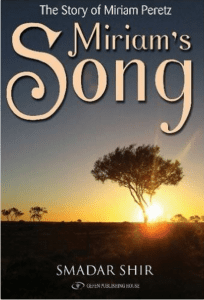Tonight begins Yom HaZikaron, Israel’s Memorial Day.
As we come toward the start of this heartwrenching day, I wanted to share with you a book I recently read — Miriam’s Song: The Story of Miriam Peretz.
Miriam’s Song is the poignant, first-person story of Miriam Peretz, an Israeli woman who lost two of her sons to war.
Her oldest son, Uriel Peretz, was commander of a Golani Brigade Special Forces unit. In November 1998, on his 22nd birthday, Uriel was killed by an explosive device planted by Hezbollah terrorists in southern Lebanon.
Twelve years later, in March 2010 – on Erev Shabbat HaGadol – her second son, Major Eliraz Peretz, was killed at the age of 32 in a fire fight in the Gaza Strip. He left behind not only his bereaved mother, brothers and sisters, but also his wife Shlomit and their four children, including a two-month old baby.
In the interim, Miriam’s husband Eliezer also passed away. He had cancer and suffered a massive heart attack after a surgery to remove the tumor. But, as Miriam writes, he mostly died of a broken heart.
As heart-breaking as the book sounds — and it is — Miriam’s Story is also surprisingly hopeful. Even optimistic.
Yes, it is the story of the terrible loss that one mother faced — and continues to face, every single morning, when she has to choose anew to get out of bed, in spite of it all.
And it is the story of the horrible personal price that Israel has paid — and continues to pay — for its security.
But it is also the story of the birth of a nation through the incoming of exiles. Miriam was born in 1954 in Cassablanca and the early chapters of the book contain the riveting story of her impoverished family’s aliyah and their first home in their new country — a tent city near Beersheva.
It is the story of the growth — and growing pains — of a nation. Miriam spent the first decade of her married life in Yamit, a Jewish settlement in the Sinai Peninsula, which was evacuated after the 1978 Peace Treaty with Egypt.
Is it also the story of faith. Not blind, unquestioning faith, but the kind of deeply personal boxing match of faith that one has with her G-d who has given, and taken, so much. “My dance with God has become a daily event,” she writes.
I feel a deep connection to Him. When I get up from bed after a sleepless night, I see the sun in the window and say, “Thanks for what I have right now.” Not for the good that might come tomorrow or the next day, but for now.
And above all, it is the story of moving beyond surviving to living.
In addition to her children and grandchildren, Miriam’s life is dedicated to her work as a educator, teaching about the ethical leadership practiced by her sons. She works with soldiers and officers, comforts bereaved families, and inspires Israeli society and the world Jewish community.
If you want to understand better what it is to live in Israel, to be a mother of a combat soldier, and to experience the unimaginable loss that makes every day a Yom HaZikaron, I highly recommend reading Miriam’s Song.
You will walk away nourished by this beautiful love song to Miriam’s family, her country, and the Jewish people.













Leave a Comment